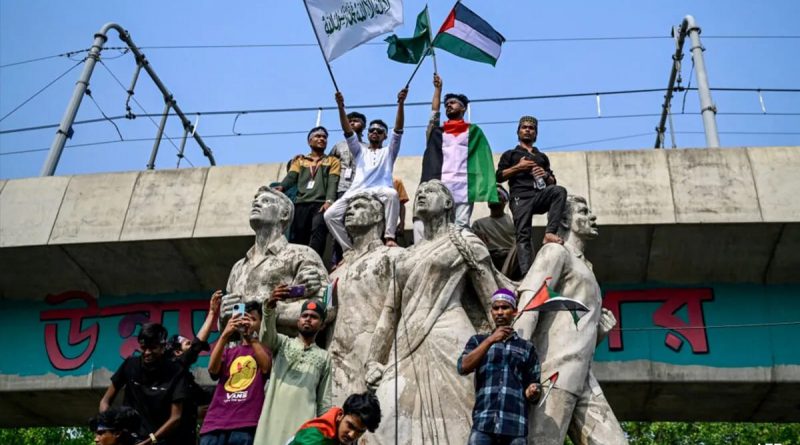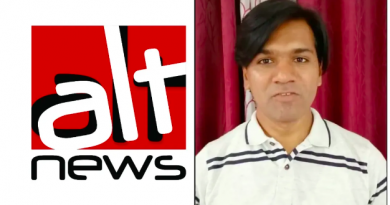OPINION: Bangladesh on a new dawn raining clouds of Extremism
Cultural and religious minorities in Bangladesh are also suffering due to rising extremism.
The New York Times published a report titled “As Bangladesh Reinvents Itself, Islamist Hard-Liners See an Opening,” detailing the rise of Islamist extremism in Bangladesh during political changes. The report discusses how religious extremists are taking advantage after the removal of former leader Sheikh Hasina.
It highlights incidents like bans on women’s soccer and public harassment of women who do not follow conservative dress codes.
There have been rallies demanding the death penalty for actions seen as blasphemy. The report notes that some Islamist groups, including previously banned ones, are pushing for stricter religious rules in the government.
Officials are working on a new constitution that might change secularism to pluralism. This shift is causing concern over weakening democratic values and increasing risks for women and minorities.
Bangladesh used to be known for its secular roots and cultural diversity, but in recent years, extremist ideas have been resurfacing. Although this isn’t an entirely new foundation, it has become more noticeable and concerning since 5th of August 2024.
Extremists are attacking secular bloggers and targeting women’s sports and cultural events. Their goal is to impose strict religious views or a political caliphate on a society that values diversity. This rise in extremist actions is worrying because it threatens freedoms, especially those of women and minorities, and poses a danger to the country’s democratic setup.
A particularly troubling aspect is the attack on women’s rights to participate in public life. For example, some women’s football matches had to be cancelled because of threats from extremist groups. This shows how these groups are trying to take over spaces that were once empowering for women. Sports provide young women with opportunities to move up socially and gain international recognition, but these are now under threat.
Such actions not only limit their dreams but also send a negative message about the shrinking space for women in public and professional life. It reflects a broader aim to suppress women’s rights under the guise of religious morality, harming the progress made in gender equality over the years.
Lifting bans on Islamist political parties like Jamat-e-Islami and freeing extremists like Mufti Jashimuddin Rahmani known as the Anwar Al Awlaki of Bangladesh, give these groups more confidence. While the interim government might claim these actions are part of a broader peace strategy, they risk legitimizing extremist ideas and giving them a platform to grow.
Inadequate systems to monitor released extremists make the situation worse, providing spaces for radical elements to regroup and plan for something like the meticulously planned October 7th Attack orchestrated by Hamas.
Meanwhile, a banned organization like Notorious Hizbut Tahrir openly propagated their influence and participation in Anti-Quota protest which for them was a tactical Jihad to oust the exiled Government and get a step ahead for their future plan of implementing a Caliphate.
This political leniency by Interim Government weakens public trust in governance and helps extremist narratives spread, they have made few arrests while the extremist leaders are free and that questions if arresting the activists while ignoring the leadership is a soft ploy to leverage a tactical narrative.
Cultural and religious minorities in Bangladesh are also suffering due to rising extremism. Attacks on Sufi shrines and other minority religious sites highlight an increase in intolerance. These aren’t isolated events but part of a plan to make all of Bangladeshi society conform to strict ideological rules.
Targeting cultural figures, authors, and artists underlines this trend, aiming to silence voices of dissent and alternative perspectives. Such actions threaten Bangladesh’s rich culture, traditionally a mix of diverse influences. We must also consider socio-economic factors driving this phenomenon.
Poverty, unemployment, and lack of access to education create conditions where extremist views can take root. Young people, especially those from marginalized backgrounds, often join these movements seeking a sense of identity, purpose, or community.
Extremist groups exploit these vulnerabilities using targeted propaganda and recruitment strategies, often through social media. Addressing these foundational issues requires comprehensive policies that promote inclusive development and foster social unity.
Political Researcher and former Pentagon Official Michael Rubin, in a US Congressional briefing highlighted the growing concern of Radicalization in Bangladesh and opinionated an article ‘Is Bangladesh the Next Afghanistan’.
Rubin is worried about how Noble Laurate Yunus is leading because it seems less tolerant than people expected. This is particularly true about how the government handles freedom of the press and different political views.
Yunus is famous around the world for his work in microfinance, which helps poor people with small loans. He took charge of the interim government after Sheikh Hasina was removed from power.
At first, many welcomed Yunus because they thought he would be different from Hasina, who was seen as too controlling. But Rubin thinks Yunus’s government is letting strict Islamist groups have too much power and is stopping people from speaking freely, which could hurt democracy.
Rubin is especially concerned about the freedom of the press under Yunus’s rule. Some journalists, like Farzana Rupa and Shakil Ahmed, have reportedly been brutally jailed on vague and ambiguous murder charges, raising fears about free speech in Bangladesh.
Over 1,000 journalists seen as “too secular” have reportedly been fired, showing a lack of tolerance for different opinions. Rubin also mentions problems faced by Julfikar Ali Manik, who reports on Islamist groups, and former Member of Parliament Fazle Karim Chowdhury, who works to protect minority rights.
These issues suggest that Yunus’s temporary government might not be supporting the diversity and human rights that are important for democracy.
Increasingly, people are showing public support for Hamas, which is a growing concern. This support is visible in rallies and in the way some individuals dress to symbolize the group.
Bangladesh, for many years, has had a clear stance against Israel. It has consistently supported Palestine through diplomatic efforts and has officially recognized only the Fatah-led government based in the West Bank. However, there is a noticeable rise in grassroots support for Hamas, especially in the wake of the ongoing Israel-Gaza conflict.
In this situation, extremists have spoken out against American interests in Bangladesh. Recently, some Islamists verbally called for aggressive protests in the U.S. Embassy in Dhaka. Along with Anti-India rhetoric, hatred for Trump’s America and Israel are seen.
These tensions are fuelled by foreign policy support for Israel. The Interim Government was supposed to carry forward a Peaceful transition towards Democratic Election, while the reality looks, they have political interests to gain in the name of ‘reform’.
Serving the interests, they are currently capitalizing on Islamists for majority support while being harsh and harsher on Secularists, Awami league activists, minorities and anyone associated with the 1971 Liberation war as tweeted by Lemkin Institute of Genocidal Prevention with multiple red flags.
Disclaimer: Views expressed by writers in this section are their own and do not reflect Milli Chronicle’s point-of-view.



